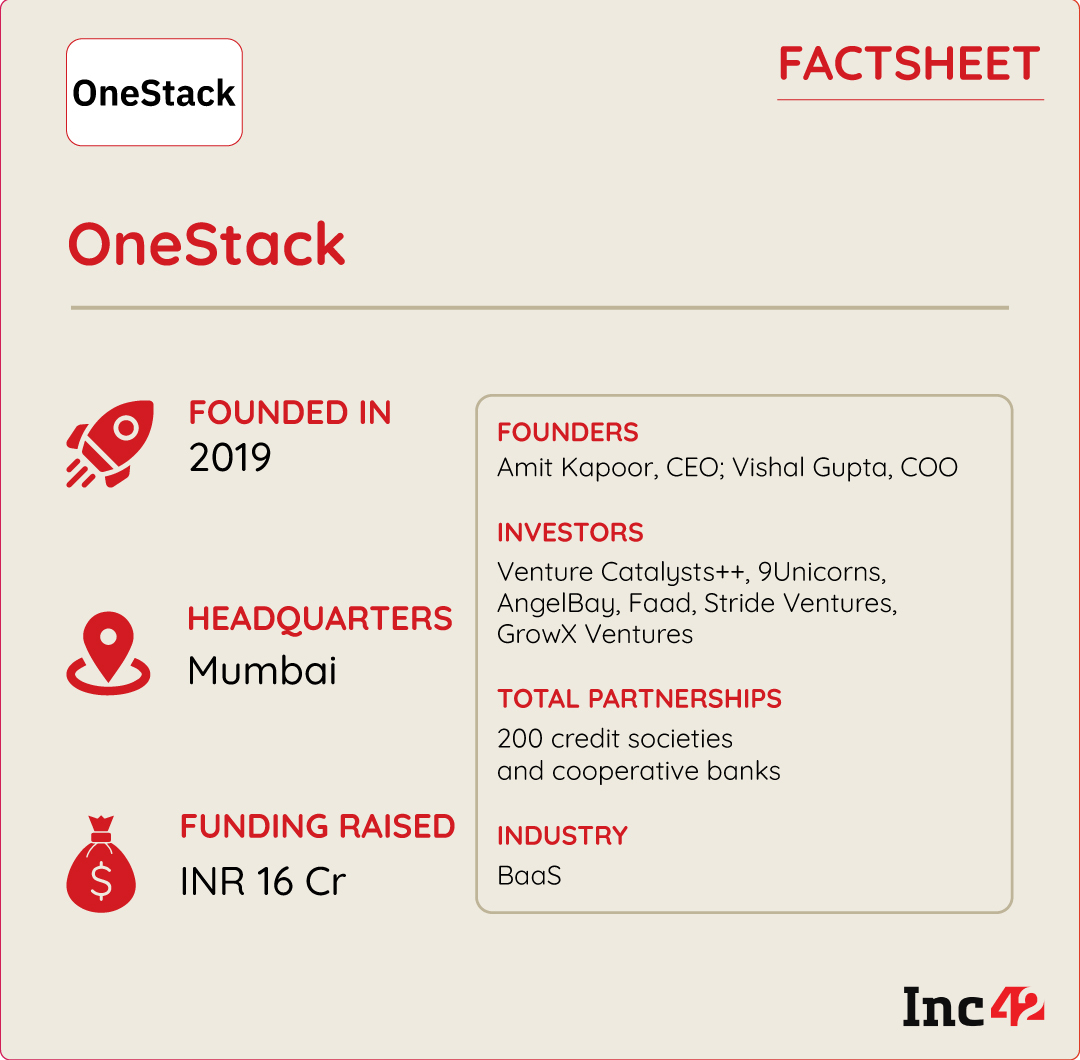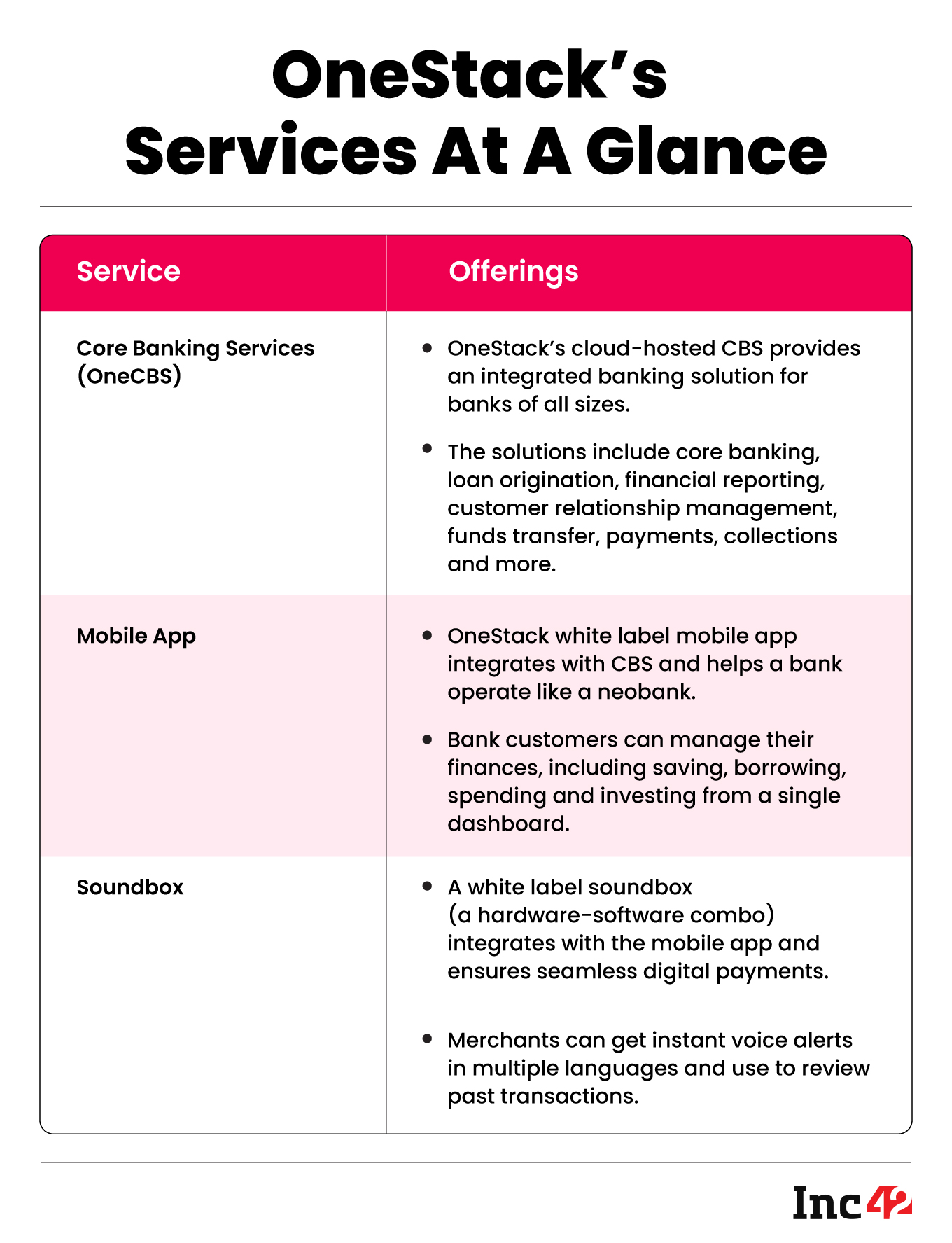Startup Stories
How BaaS Startup OneStack’s Neobank-Like Solutions Digitally Empower Co-operative Banks, Credit Societies

India’s push towards digital transformation in the banking and financial sectors has seen the rise of a new-age citizenry seeking technology-driven services for enhanced customer experience. However, not all Indian banks have invested heavily in tech adoption to improve their offerings and attract a larger customer base.
India has a vast network of more than 1 Lakh urban and rural co-operative banks and societies, according to industry experts, serving middle- and low-income customers and micro -small-to-medium businesses. Besides, numerous niche credit societies cater to small borrowers from the unbanked/underbanked population. Many of these financial institutions still leverage outdated tech tools and safety/compliance-deficient processes without full-stack core banking solutions (CBS) and easy-to-use mobile banking apps. This has led to a loss of customers, as people today want banks to digitalise fast and excel in every service area, be it transactions, saving, lending, insurance or wealth creation.
Set up by Amit Kapoor and Vishal Gupta, Mumbai-based BaaS (banking as a service) startup OneStack is a technology service provider (TSP) that helps co-operative banks and credit societies to digitise and enhance their digital capabilities. The B2B2C platform has developed easy-to-use APIs to offer a wide range of core banking solutions or CBS, enabling FIs of all sizes to provide top-end services in sync with evolving requirements.
It has also created a white-label mobile app that can be branded and customised by a bank to help its customers carry out key financial activities. The app features a unified dashboard, providing a consolidated view of the bank’s products and services and enabling its customers to track their assets, liabilities and cost-to-income ratio to determine their financial health.
The platform’s CBS stack is in the cloud and is integrated with its mobile app for seamless operations. The aim is to ensure that all ‘Bharat’ banks will have the technology edge on a par with digital-first neobanks, which are becoming increasingly popular for their agility, versatility and customer engagement.
OneStack’s CBS (OneCBS) helps build, customise and launch full-stack banking services, including KYC and customer onboarding, account opening, bill payment, fund transfer, card management, CRM, financial reporting and more. While its QR and UPI services (payment issuance and acceptance) have driven partner banks’ CASA growth, the platform has also entered the micro-lending space using OCEN, a cluster of APIs seamlessly connecting borrowers and lenders.
Besides, it uses AI/ML solutions to analyse bank customers’ data and deliver recommendations for insurance and investment products to improve their financial health.
“Our CBS empowers banks to streamline their operations and enhance customer service efficiently, along with helping them to be completely regulatory compliant to compliance,” said founder and CEO Amit Kapoor.
Among its value-added services is the soundbox, a seamless digital payment solution for merchants, which can be deployed through co-operative banks and credit societies. These smart devices instantly announce payment alerts in Hindi, English and other regional languages, while customers can pay through UPI and other channels (more on that later).
The startup claims to have onboarded more than 200 co-operative banks and credit societies. It also secured $2 Mn in a pre-Series A round in July 2023 from Venture Catalysts++, growX Ventures, Stride Ventures, 9Unicorns, Sunil Kulkarni and other existing investors.

Tapping Into Remote Areas Is Tough; Here’s How OneStack’s Marketing Works
By the time Kapoor started his entrepreneurial journey in 2012 with Airpay (an omnichannel payment platform), he had actively collaborated with the BFSI sector and worked on critical fintech solutions such as payment gateways and the PoS (point of sale) ecosystem. He also engaged with co-operative banks and realised how their inability to provide essential digital solutions hindered customer service.
It was a eureka moment for Kapoor when he saw the massive potential. OneStack was launched in 2019 to digitise the co-operative banking industry. Four years later, Vishal Gupta joined the startup as a co-founder. Gupta and Kapoor have known each other since 2012 when they pursued business studies together at INSEAD (Institut Européen d’Administration des Affaires).
The first major hurdle was a connectivity challenge that very few had anticipated. Most credit societies (and some rural co-operative banks) were located in such remote areas that OneStack’s sales team had to travel for a few days to reach their destinations. These long journeys ate into the startup’s time and resources, and the young company was compelled to rethink its marketing and sales.
OneStack operated in western and northern India then and onboarded two of the three banks in Mizoram. However, it implemented a two-pronged marketing strategy to grow its customer base substantially. The platform opted for B2B promotion to resonate with the specific regional requirements of the co-operative sector. Therefore, its vernacular muscle/regional language services came into play.
The other strategy was word-of-mouth promotion, helping the startup gain visibility. Initially, this meant tapping into the founder’s networks and connections. However, after experiencing OneStack’s offerings, user banks spoke highly of its services and recommended its use, thus amplifying its reach across Indian states.
Besides, the startup received immense support from its investor Venture Catalysts++.
“Initially, I had shared a concept of OneStack on a preliminary deck and the investors believed in us since the first day,” said Kapoor, emphasising how proactively the VC firm supported him.
Venture Catalysts’++ investment of INR 1.5 Cr in the startup’s seed round proved to be more than just financial backing. Its involvement in connecting the startup with key players and other investors in the ecosystem provided invaluable support that spurred its growth, said Kapoor.
“Meeting with Apoorva Sharma (co-founder of Venture Catalysts++ and 9Unicorns) is intense and very interactive. His clarity of thought and the ability to put the same in words are amazing. Every time I meet him, I get to learn more about my own business,” he added.
 A Deep Dive Into OneStack’s Core Service Spectrum
A Deep Dive Into OneStack’s Core Service Spectrum
A bank’s journey with OneStack starts with a comprehensive onboarding process. The startup offers personalised support to every bank by assigning a dedicated account manager who assists the bank until its services are successfully launched post-API integration, which may take up to 15 days.
Its core offering is the cloud-based OneCBS, which provides integrated banking solutions such as payments and fund transfers, collections, loan assessment and approval (auto, home, and SME loans, as well as pre-sanctioned credit lines through UPI), customer relationship management, and submission of multiple audits/reports to the RBI and other regulatory bodies. Together, this service cluster helps banks run their operations more efficiently, reduce risks, and develop tailored solutions/financial products for their customers based on the extensive data analytics capabilities built into the system.
Additionally, there is a user-facing white-label app so that bank customers can easily manage their finances, including saving, borrowing, spending, and investing, from a single dashboard. As the app generates accurate financial snapshots, banking customers can analyse the same to make informed decisions, while co-operative banks get a competitive edge over their mainstream peers.
Talking about OneStack’s UPI/QR payment solution, he said its (merchant-focussed) B2B approach differentiates the service from the rest as established players like Paytm and PhonePe target the consumer side (B2C) of the payment business. On the other hand, the startup provides audio-enabled soundboxes (a hardware-software combo) as a white-label solution so that these smart devices can be branded as banks’ own and delivered to their merchants to ensure seamless digital payments.
A merchant can receive a soundbox from a bank (supplied by OneStack) by paying INR 1 per month. As soon as payments are received, they get instant voice alerts in multiple languages to keep them updated. The device can also be used to review past transactions, and its functionalities can be integrated with mobile apps for quick and hassle-free usage.
Payments collected through soundboxes go directly to the merchant accounts held at co-operative banks, claims Kapoor. This simplifies financial transactions for micro-sellers while reinforcing banks’ branding against leading fintech players.
Revenue is generated through BaaS subscriptions (payments for the OneCBS stack), white-label solutions, and value-added services, or VaS, many of which are work in progress. However, the platform will soon roll out various value-added services, including insurance, investment products, co-branded cards, and more. Earnings from these channels will complement the income generated by OneStack’s core offerings.
BaaS Is Brilliant, But Will There Be Indian Takers?
OneStack’s genesis lies in open banking, which has surpassed pure-play BaaS and aims to transform the narrow domain of legacy banking. It may sound too forward-thinking, but Kapoor pointed out that 380 Mn Indians currently account for 50% of the bankable population across metros and Tier II and III cities. In essence, the need for agile banking solutions is growing exponentially. But a mammoth increase in infrastructure and operational costs will be unviable, given the macroeconomic headwinds and the threat of a global slowdown.
Considering these, the OneStack founder wants to extend core banking services to the remaining bankable population in the next two years by adding neobanking capabilities to 150 more co-operative banks. Its growth plan involves expanding pan-India and raising another round of funding by FY25.
OneStack’s endeavour to cover the total addressable market (TAM) within the co-operative banking sector will further reinforce the promise of broadening financial inclusion. In fact, the growing impact of Indian BaaS startups, such as OneStack, Setu and Zeta, has created a paradigm shift, meeting end-to-end customer requirements and improving customer experience as never before.
Globally, the BaaS market is expected to reach $11.6 Bn by 2028 from an estimated $4.4 Bn in 2023, growing at a CAGR of 26.60%, a thumping rise that augurs well for industry players. No doubt there had been initial hesitation closer home regarding compliance and data security, to say nothing about the tech overhaul needed to maximise BaaS benefits. But the Lego-like API block-building and financial service sachetisation will be a win-win for incumbent banks and FIs, new-age fintech providers and TSPs like OneStack as it will put customers at the centre and help grow the banking ecosystem to the back of beyond.
Startup Stories
Byju’s partially pays March salaries, pending February payouts.

Byju’s, a prominent player in the edtech industry, has encountered financial challenges resulting in delayed salary payments for its employees. As of April 20, the company has only disbursed a portion of March salaries, attributing the delay to a severe cash crunch. Despite earlier assurances from the company’s management that salaries for March would be paid by April 18, many mid-senior employees have reported receiving only 50% of their March salaries. Additionally, February salaries remain unpaid for a significant number of employees, further exacerbating the situation.
Founder and CEO, Byju Raveendran, has resorted to raising personal debt against his stakes in the company to facilitate salary payments. This underscores the severity of the financial challenges facing Byju’s and highlights the lengths to which Raveendran is willing to go to address the issue.
Employee testimonies reveal the extent of the salary delays, with one employee stating that they received only 50% of their March salary on April 20, with 80% of their February salary still pending. Another concerning aspect is the reported disparity between junior and senior employees, with junior staff receiving full salary payments while top management has gone without salaries for the past two months.
Byju’s has acknowledged the delay in salary payments but has not provided a detailed explanation for the situation. A company spokesperson declined to comment on queries from ET regarding the matter. In an email sent to employees on April 8, the management team expressed regret over the delay and attributed it to the inability to secure approval to access funds from a rights issue. The delay has been further compounded by actions from foreign investors, hindering the company’s access to necessary funds.
This revelation follows a previous report by ET on April 1, which highlighted Byju’s decision to delay salary payments due to constraints imposed by warring investors, limiting the company’s access to funds through a rights issue. The ongoing dispute with investors, including Dutch investor Prosus, has added to Byju’s financial woes and has led to further delays in resolving the issue.
In a separate development, Byju’s India chief executive, Arjun Mohan, announced his departure from the company in mid-April, just six months after assuming the role. This unexpected move prompted founder Byju Raveendran to take on the responsibility of overseeing day-to-day operations of the company’s India business, housed under Think & Learn, marking a significant shift in leadership.
Amidst these challenges, Byju’s is embroiled in a legal battle with a group of investors led by Prosus, who are seeking to block a rights issue and the removal of Byju Raveendran as CEO. The company has also initiated arbitration proceedings to address the dispute and find a resolution.
The rights issue undertaken by Byju’s is significant, as it is being offered at a staggering 99% discount to the company’s peak valuation of $22 billion. This steep discount has implications for investors who choose not to participate in the funding, potentially resulting in a significant dilution of their shareholding post-completion of the rights issue.
The unfolding events at Byju’s underscore the challenges facing the edtech giant as it navigates financial constraints, leadership transitions, and legal disputes. The company’s ability to address these issues effectively will determine its future trajectory and its ability to maintain its position in the competitive edtech landscape.
Startup Stories
Revolut India receives provisional approval for PPI license from RBI

Revolut India, a neobank backed by Tiger Global and Softbank, has secured an in-principle approval from the Reserve Bank of India (RBI) for issuing Prepaid Payment Instruments (PPI), encompassing prepaid cards and wallets. CEO Paroma Chatterjee shared this development in a LinkedIn post on Friday. This approval complements Revolut India’s existing licenses from the RBI, which allow it to function as a Category-II Authorised Money Exchange Dealer (AD II), enabling the issuance of multi-currency forex cards and cross-border remittance services.
Chatterjee emphasized the significance of this milestone, highlighting the opportunity it presents to provide Indian consumers with both international and domestic payment solutions on a unified platform. Revolut, Europe’s largest neobank, entered the Indian market in 2021 with aspirations to disrupt the domestic payments sector. The RBI’s approval is expected to bolster Revolut’s position as a key player in this domain.
Prepaid Payment Instruments (PPIs) are payment tools that utilize stored monetary value, including digital wallets, smart cards, or vouchers, for transactions. RBI Governor Shaktikanta Das proposed on April 5, 2024, to allow PPIs to be linked through third-party UPI applications, enabling PPI holders to conduct UPI payments akin to bank account holders.
Chatterjee underscored Revolut’s commitment to full compliance with regulatory requirements, particularly in India, where the neobank has undertaken significant efforts to localize its global tech-stack to adhere to local regulations.
In an interview with ET BFSI, Chatterjee disclosed Revolut’s plans to introduce a comprehensive suite of digital-first money management services for all Indian customers. These services will enable users to manage their finances, including payments and remittances, both domestically and internationally.
The app, currently in use by employees, will be officially launched once the internal testing phase is completed, according to Chatterjee. She also revealed that there are over 175,000 prospective customers on Revolut India’s waitlist, indicating strong interest in the product.
Startup Stories
Postman buys Orbit to extend developer community reach.

Postman, renowned as an API management platform tailored for enterprises, has recently made headlines with its acquisition of Orbit, a pivotal tool in the arsenal of developer companies for nurturing communities across a spectrum of platforms, including Discord, Slack, and GitHub. Although the specifics of the financial transaction remain undisclosed, Postman took to its blog to underline Orbit’s indispensable role in supporting major developer companies in fostering community management and fostering growth over the course of the past four years.
Within the ecosystem of Postman, the integration of Orbit is poised to be transformative, with the Orbit team set to assume a pivotal role in seamlessly embedding community-centric features into the fabric of the Postman Public API Network. This strategic move is aimed at catalyzing dynamic collaboration between content creators and end-users within the network. Postman, boasting a staggering valuation of $5.6 billion, stands as a stalwart in the realm of API collaboration platforms, serving a user base exceeding 30 million developers and 500,000 organizations.
Under the stewardship of Noah Schwartz, a recent addition to the Postman team hailing from Amazon Web Services, the Orbit team is primed to spearhead initiatives aimed at empowering API distributors to broaden the horizons of their communities, optimize API utilization, and solicit direct feedback from users entrenched within the network.
This integration is anticipated to embolden developers to unearth APIs tailored to their unique requirements and foster meaningful engagements with peers to extract maximum value from each API. However, as part of the transitionary phase, Orbit has outlined plans to gradually phase out its existing product and platform over the span of the next 90 days. Commencing July 11, all functionalities will be deactivated, with no provision for the creation of new users or workspaces.
Postman’s strategic maneuver comes on the heels of its triumphant fundraising endeavor in 2021, securing a whopping $225 million in funding. The fundraising round, spearheaded by Insight Partners, witnessed active participation from prominent entities such as Coatue, Bond Capital (helmed by Mary Meeker), and Battery Ventures.
-

 Startup Stories1 year ago
Startup Stories1 year agoWhy Millennials, GenZs Are Riding The Investment Tech Wave In India
-

 Startup Stories1 year ago
Startup Stories1 year agoStartups That Caught Our Eyes In September 2023
-

 Startup Stories1 year ago
Startup Stories1 year agoHow Raaho Is Using Tech To Transform India’s Fragmented Commercial Trucking
-

 Startup Stories1 year ago
Startup Stories1 year agoMeet The 10 Indian Startup Gems In The Indian Jewellery Industry’s Crown
-

 Crptocurrency10 months ago
Crptocurrency10 months agoLither is Making Crypto Safe, Fun, and Profitable for Everyone!
-

 Startup Stories1 year ago
Startup Stories1 year agoWOW Skin Science’s Blueprint For Breaking Through In The $783 Bn BPC Segment
-

 Startup Stories1 year ago
Startup Stories1 year agoHow Volt Money Is Unlocking The Value Of Mutual Funds With Secured Lending
-

 E-commerce1 year ago
E-commerce1 year agoTop Online Couponing Trends To Watch Out For In 2016




